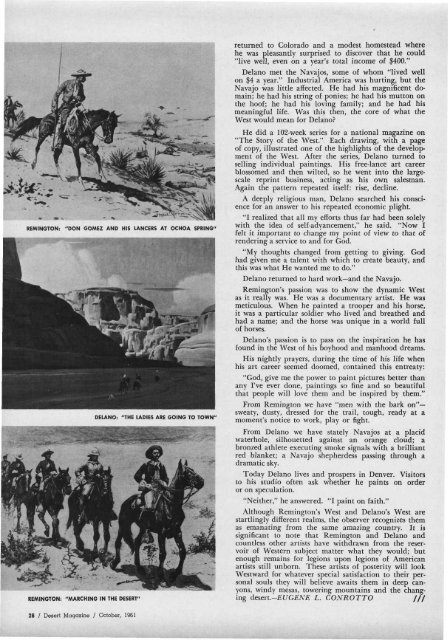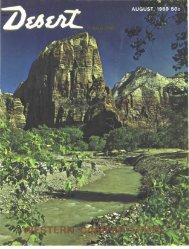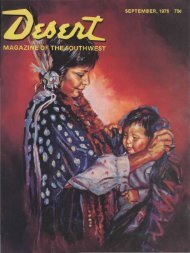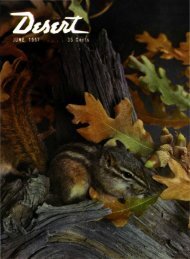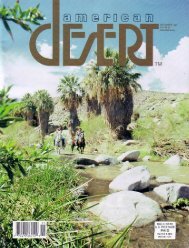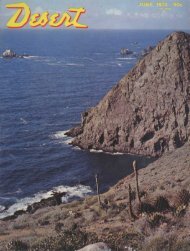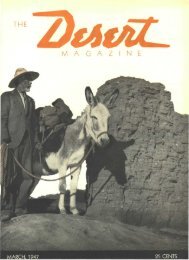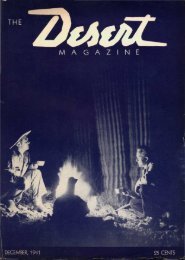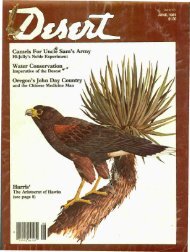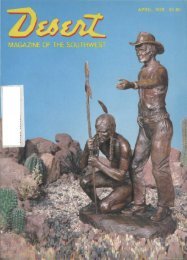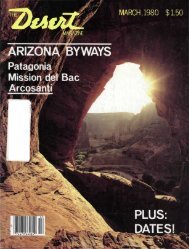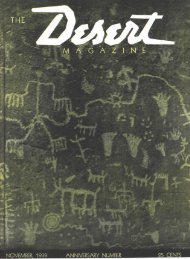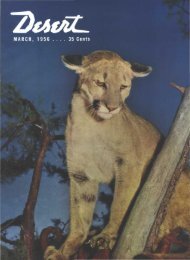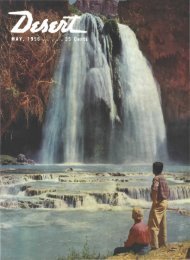OUTDOOR SOUTHWEST - Desert Magazine of the Southwest
OUTDOOR SOUTHWEST - Desert Magazine of the Southwest
OUTDOOR SOUTHWEST - Desert Magazine of the Southwest
You also want an ePaper? Increase the reach of your titles
YUMPU automatically turns print PDFs into web optimized ePapers that Google loves.
. • -• ^ ' • • . : • . ; • .<br />
REMINGTON: "DON GOMEZ AND HIS LANCERS AT OCHOA SPRING"<br />
REMINGTON: "MARCHING IN THE DESERT"<br />
26 / <strong>Desert</strong> <strong>Magazine</strong> / October, 1961<br />
DELANO: "THE LADIES ARE GOING TO TOWN"<br />
returned to Colorado and a modest homestead where<br />
he was pleasantly surprised to discover that he could<br />
"live well, even on a year's total income <strong>of</strong> $400."<br />
Delano met <strong>the</strong> Navajos, some <strong>of</strong> whom "lived well<br />
on $4 a year." Industrial America was hurting, but <strong>the</strong><br />
Navajo was little affected. He had his magnificent domain;<br />
he had his string <strong>of</strong> ponies; he had his mutton on<br />
<strong>the</strong> ho<strong>of</strong>; he had his loving family; and he had his<br />
meaningful life. Was this <strong>the</strong>n, <strong>the</strong> core <strong>of</strong> what <strong>the</strong><br />
West would mean for Delano?<br />
He did a 102-week series for a national magazine on<br />
"The Story <strong>of</strong> <strong>the</strong> West." Each drawing, with a page<br />
<strong>of</strong> copy, illustrated one <strong>of</strong> <strong>the</strong> highlights <strong>of</strong> <strong>the</strong> development<br />
<strong>of</strong> <strong>the</strong> West. After <strong>the</strong> series, Delano turned to<br />
selling individual paintings. His free-lance art career<br />
blossomed and <strong>the</strong>n wilted, so he went into <strong>the</strong> largescale<br />
reprint business, acting as his own salesman.<br />
Again <strong>the</strong> pattern repeated itself: rise, decline.<br />
A deeply religious man, Delano searched his conscience<br />
for an answer to his repeated economic plight,<br />
"I realized that all my efforts thus far had been solely<br />
with <strong>the</strong> idea <strong>of</strong> self-advancement," he said. "Now I<br />
felt it important to change my point <strong>of</strong> view to that <strong>of</strong><br />
rendering a service to and for God.<br />
"My thoughts changed from getting to giving. God<br />
had given me a talent with which to create beauty, and<br />
this was what He wanted me to do."<br />
Delano returned to hard work—and <strong>the</strong> Navajo.<br />
Remington's passion was to show <strong>the</strong> dynamic West<br />
as it really was. He was a documentary artist. He was<br />
meticulous. When he painted a trooper and his horse,<br />
it was a particular soldier who lived and brea<strong>the</strong>d and<br />
had a name; and <strong>the</strong> horse was unique in a world full<br />
<strong>of</strong> horses.<br />
Delano's passion is to pass on <strong>the</strong> inspiration he has<br />
found in <strong>the</strong> West <strong>of</strong> his boyhood and manhood dreams.<br />
His nightly prayers, during <strong>the</strong> time <strong>of</strong> his life when<br />
his art career seemed doomed, contained this entreaty:<br />
"God, give me <strong>the</strong> power to paint pictures better than<br />
any I've ever done, paintings so fine and so beautiful<br />
that people will love <strong>the</strong>m and be inspired by <strong>the</strong>m."<br />
From Remington we have "men with <strong>the</strong> bark on"—<br />
sweaty, dusty, dressed for <strong>the</strong> trail, tough, ready at a<br />
moment's notice to work, play or fight.<br />
From Delano we have stately Navajos at a placid<br />
waterhole, silhouetted against an orange cloud; a<br />
bronzed athlete executing smoke signals with a brilliant<br />
red blanket; a Navajo shepherdess passing through a<br />
dramatic sky.<br />
Today Delano lives and prospers in Denver. Visitors<br />
to his studio <strong>of</strong>ten ask whe<strong>the</strong>r he paints on order<br />
or on speculation.<br />
"Nei<strong>the</strong>r," he answered. "I paint on faith."<br />
Although Remington's West and Delano's West are<br />
startlingly different realms, <strong>the</strong> observer recognizes <strong>the</strong>m<br />
as emanating from <strong>the</strong> same amazing country. It is<br />
significant to note that Remington and Delano and<br />
countless o<strong>the</strong>r artists have withdrawn from <strong>the</strong> reservoir<br />
<strong>of</strong> Western subject matter what <strong>the</strong>y would; but<br />
enough remains for legions upon legions <strong>of</strong> American<br />
artists still unborn. These artists <strong>of</strong> posterity will look<br />
Westward for whatever special satisfaction to <strong>the</strong>ir personal<br />
souls <strong>the</strong>y will believe awaits <strong>the</strong>m in deep canyons,<br />
windy mesas, towering mountains and <strong>the</strong> changing<br />
desert.-£C7G£A r £ L. CONROTTO ///


